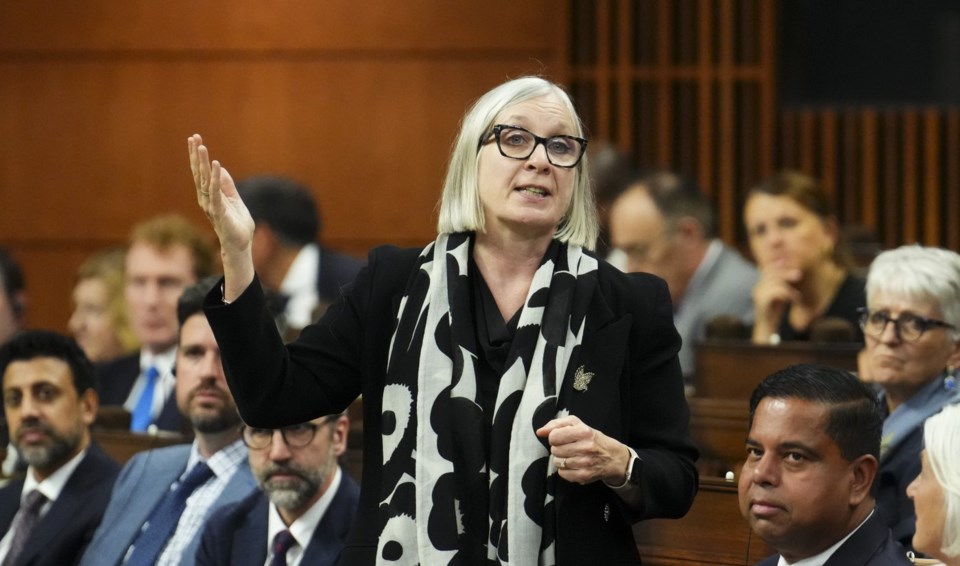OTTAWA — Ottawa is giving no sign that it intends to amend existing legislation on medical assistance in dying — something a UN committee called for earlier this spring.
The federal minister responsible for disabilities spoke at a hearing of the United Nations Committee on the Rights of Persons with Disabilities last week, about two months after the committee called on Canada to repeal the 2021 law that expanded eligibility for assisted dying to those whose deaths were not reasonably foreseeable.
Jobs and Families Minister Patty Hajdu gave a speech at the UN last Tuesday to mark 15 years since Canada ratified the Convention on the Rights of Persons with Disabilities.
"It's about, for me, making relationships in this space and making sure that I have a really strong connection with the community, which I think is really important to be a good minister," she said in an interview after the speech.
Her address did not cite the committee's report, which was released in late March as the federal election got underway.
The report said the committee is "extremely concerned" about Canada's policy on track 2 medical assistance in dying.
"(T)he concept of 'choice' creates a false dichotomy, setting up the premise that if persons with disabilities are suffering, it is valid for (Canada) to enable their death without providing safeguards that guarantee the provision of support," the report said.
In a written statement, a spokesperson for Hajdu said the government thanks the committee for its report.
"MAID is a deeply personal choice. We will make sure that the rights of persons with disabilities are upheld and protected," said Jennifer Kozelj.
Disability rights groups in Canada have argued the law singles out people with disabilities who are suffering because they're unable to access proper support.
Last September, Inclusion Canada was among a group of organizations that filed a Charter of Rights challenge against what's known as track 2 MAID.
In court documents, they argued the law "allows people with disabilities to access state-funded death in circumstances where they cannot access state-funded supports they need to make their suffering tolerable."
The organization's CEO, Krista Carr, said she wants to see Ottawa deliver an action plan on implementing the recommendations in the UN report.
"It was crystal clear — the United Nations said they need to repeal track 2 medical assistance in dying," she said.
Garnett Genuis, the Conservative employment critic, said he came away from the UN event worried about Canada's international reputation being harmed by what he called Ottawa's "failures to uphold our obligations to protect the rights of people with living with disabilities."
"There is a lot of concern internationally within the disability rights community about what's happening in Canada around euthanasia and people living with disabilities," he said.
Genuis said he would support additional guardrails around track 2 assisted dying. In New Zealand, he pointed out, health professionals cannot suggest assisted dying as an option but are able to provide information to patients who ask for it.
"I think that would be a meaningful way of improving the experience of people living with disabilities who interact with the health-care system," he said.
The offices of Health Minister Marjorie Michel and Justice Minister Sean Fraser did not say whether Ottawa is considering changes to the assisted dying law as a result of the report.
A spokesman for Michel cited strict eligibility requirements and "multiple robust safeguards" in the current law.
Canada's medical assistance in dying law was updated in 2021 after the Quebec Court of Appeal found that limiting access to people whose deaths were reasonably foreseeable amounted to discrimination.
The federal government opted not to take that ruling to the Supreme Court, and instead changed the law to broaden eligibility.
The latest annual report on medical assistance in dying shows that 622 of the 15,343 people who had an assisted death in 2023 were part of that track 2. They included 210 people who self-identified as having a disability.
The report said that less than three per cent of the people who qualified for an assisted death in 2023 said they did not receive the disability support services they needed.
The most frequently reported disabilities among MAID recipients were mobility and pain-related.
To be considered eligible to apply for MAID, a person must have a grievous and irremediable medical condition.
For people whose death is not reasonably foreseeable, there's a minimum 90-day waiting period between the first assessment and the procedure.
The applicant must be informed of counselling, mental health supports, disability supports, community services and palliative care, and must be offered consultations with relevant professionals.
The applicant and two different medical practitioners also have to discuss means to relieve the person's suffering and "agree that the person has seriously considered these means," according to Health Canada's website.
This report by The Canadian Press was first published June 19, 2025.
Sarah Ritchie, The Canadian Press


